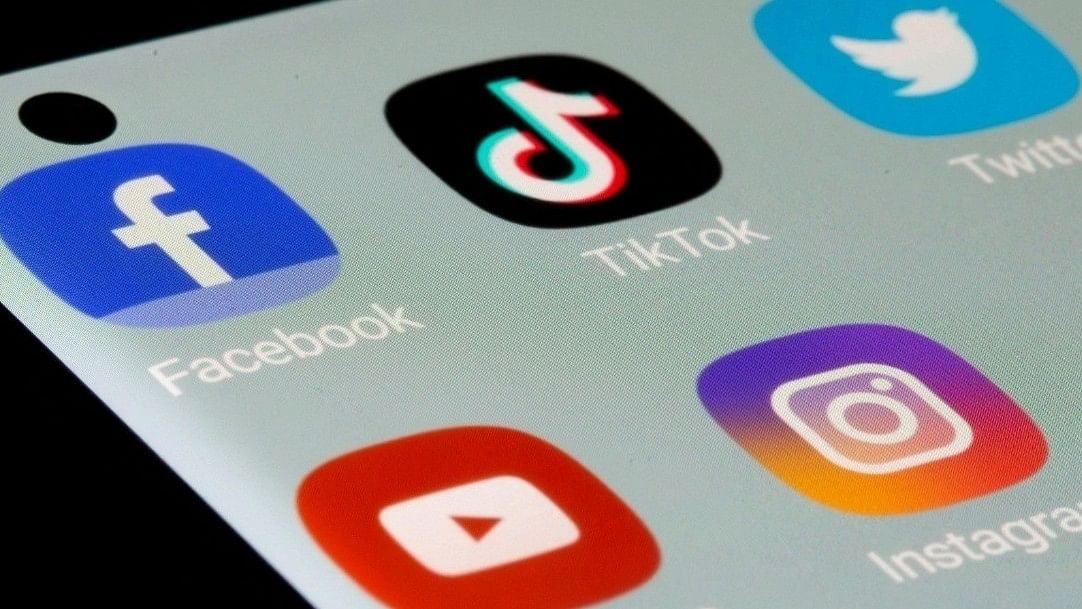
Social media apps on a phone.
Credit: Reuters File Photo
In an era where social media’s reach is limitless, its influence on democracy and human relationships has become a topic of intense discussion. While social media platforms are lauded for enhancing knowledge sharing and community building, they can also shape political landscapes and affect personal interactions in profound ways.
Consider Barack Obama’s 2008 presidential campaign in the US: social media showcased its power to secure victories, but the 2010 Cambridge Analytica scandal revealed significant drawbacks. Personal information from millions of Facebook users was harvested without consent for political advertising, affecting the 2016 US election and the Brexit referendum. In India, social media is crucial for political parties, which use platforms such as Facebook and WhatsApp for propaganda. The BJP, India’s wealthiest party, allegedly benefited from Facebook’s algorithms, enabling more efficient voter outreach at lower advertising costs.
India’s social media landscape is vast and steadily growing. In January 2024, the country had 751.5 million internet users, with 52.4% internet penetration. About 462 million people, or 32.2% of the total population, use social media. A recent survey, involving 7,463 respondents aged 15 and older from 19 states and union territories, revealed that WhatsApp is India’s leading social media network, followed by Facebook. The survey noted that active social media penetration in India is 32.8%, with 18- to 25-year-olds constituting the largest share of users. Notably, 31% of this age group use six to nine social media platforms simultaneously. Such exponential growth is bound to influence nations’ and their people’s social, political, and cultural realms.
Research has proven, for instance, that social media positively influences democratic engagement. A Pew Research Centre survey conducted between 2022 and 2023 across 27 countries revealed that people in 20 countries believe social media benefits democracy. In emerging economies such as Nigeria, Mexico, Singapore, and India, most of the population feels that social media has advanced their democratic processes, with 77% of respondents in Nigeria and Mexico, 76% in Singapore, and 74% in India supporting this view.
This perspective is reflected in India’s recent parliamentary elections, where political influencers and election-related content on platforms such as You Tube garnered millions of views, demonstrating social media’s role in moulding public opinion and political discourse. The I.N.D.I.A bloc supporters argue that the election results indicate a public mandate for a robust democracy facilitated by a resurgent opposition, a development significantly aided by social media. They go on to add that this is a clear message to the ruling party: India must continue its democratic traditions, eschewing hate politics and majoritarianism while focusing on pressing issues such as unemployment and price rises.
While social media connects people globally, its impact on personal relationships is a double-edged sword. Research links adolescent depression to social media use, yet it also facilitates diverse friendships and accessible support networks. Social media can diminish self-esteem and provide a vital space for emotional support for teenagers. A 2022 Pew survey found that 54% of American teens would struggle to give up social media, with some using it almost constantly. While 80% feel more connected with friends, 71% see social media as a creative space, 38% feel overwhelmed by drama, and 29% feel pressured to post attention-grabbing content. The situation in India may not be very different. The excessive use of social media, particularly when it exceeds three hours daily, is associated with internalising problems, highlighting its potential contribution to adolescent mental health struggles. Adults are not immune to these effects. The spread of misinformation, particularly around sensitive topics like politics and religion, has led to real-world consequences such as mob violence in India. Social media’s tendency to amplify confirmation bias can result in cognitive dissonance and strained relationships. According to a 2022 Pew survey, 17% of US adults have unfollowed
or blocked someone on social media due to religious or political content.
Social media fosters political awareness and relationships but needs mindful use. Users must consider the impact of their posts, avoid unverified information, and be wary of politically or religiously charged messages that can strain relationships. Intelligent use promotes peaceful coexistence. Muting conversations and educating people about social media’s adverse effects can mitigate the negatives. Understanding its dual nature—connecting and dividing—is essential.
(The writer is Professor and Dean, Christ deemed to be University, Bengaluru)